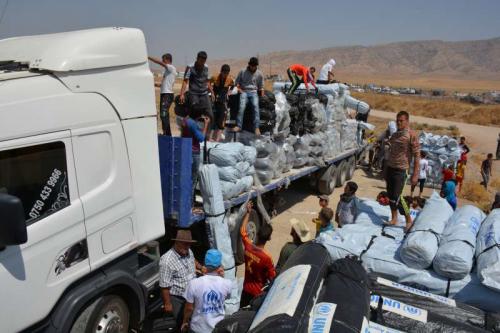Iraq: UN refugee agency launches major humanitarian aid push for displaced people
The United Nations refugee agency said that it is launching one of its largest humanitarian aid pushes in response to the deteriorating situation in Iraq, aiming to help close to a half million people who had been forced to flee their homes.

Workers unload trucks laden with hundreds of tents for families displaced by the recent fighting in Iraq.
Barring last minute delays, an air, road and sea operation will begin with a four-day airlift from Aqaba in Jordan to Erbil in Iraq. This will be followed by road convoys from Turkey and Jordan, and sea and land shipments from Dubai via Iran over the next 10 days.
“The major focus is on improving living conditions for the displaced in the region, particularly people without shelter or housing,” said Adrian Edwards, spokesperson for the UN High Commissioner for Refugees (UNHCR). “Conditions remain desperate for those without access to suitable shelter, people struggling to find food and water to feed their families, and those without access to primary medical care.
“Many are still coming to grips with the tragedy they’ve been through in recent weeks – fleeing homes with nothing, and many trying to cope with the loss of loved ones. Emergency support is an urgent need that we are trying to meet,” he told reporters in Geneva.
Included in the initial aid shipments are 3,300 tents, 20,000 plastic sheets, 18,500 kitchen sets, and 16,500 jerry cans. This assistance and further aid deliveries is being made possible thanks to a recent $500 million donation from Saudi Arabia, as well as support from the United States, the United Kingdom, Japan, Denmark, Kuwait, Luxembourg, Norway, Sweden and global retailer IKEA – a UNHCR corporate partner.
Meanwhile, inside Iraq, UNHCR is already working closely with regional authorities in the Kurdistan Region, where at least half the displaced have settled, some 200,000 of them since early August when the city of Sinjar and neighbouring areas were seized by armed groups.
The Saudi contribution has also enabled the UN World Food Programme (WFP) to scale up food assistance to hundreds of thousands of Iraqis displaced from their homes in recent weeks.
“The food security situation in Iraq is alarming – the worst that the country has witnessed since the sanctions in the early 1990s,” Mohamed Diab, Director of WFP’s Regional Bureau for the Middle East, North Africa, Central Asia and Eastern Europe, said in a news release.
“The breakdown of the Public Distribution System for food in many parts of Iraq, the destruction and confiscation of agricultural produce, widespread insecurity and massive displacement of civilians have resulted in immense hardship and untold human suffering,” he stated.
Despite a challenging security situation and displaced people on the move since mid-June, WFP has distributed food to more than 524,000 people in 10 governorates across the country and has plans to scale up its operation to reach 1.2 million people by early 2015.
An estimated 1.2 million Iraqis have been displaced so far in 2014, including some 600,000 people uprooted by the Anbar province crisis which began in January, and 600,000 displaced from conflicts in and around Mosul and more recently Sinjar, since August.
The UN humanitarian spokesperson in Iraq, Kieran Dwyer, said in an interview with UN Radio , that resources are a critical element to helping the hundreds of thousands affected by the ongoing crisis in the country.
“This $500 million from the Saudi Government is allowing the United Nations to scale up fast and get aid wherever we can get access to work with the local authorities,” Mr. Dwyer said.
He added that security is a major challenge in gaining access to many areas of Iraq and delivering vital assistance to those who need it.
“Humanitarian workers cannot get access to many areas of Iraq in order to deliver aid,” he said, noting the rapid unravelling of the humanitarian situation and well as the still unstable security situation. “We need to urgently make sure we have the conditions for them to survive and secondly, we need to stabilize the situation so that we can bring consistent services.”
Source: United Nations
- 389 reads
Human Rights
Fostering a More Humane World: The 28th Eurasian Economic Summi

Conscience, Hope, and Action: Keys to Global Peace and Sustainability

Ringing FOWPAL’s Peace Bell for the World:Nobel Peace Prize Laureates’ Visions and Actions

Protecting the World’s Cultural Diversity for a Sustainable Future

Puppet Show I International Friendship Day 2020

